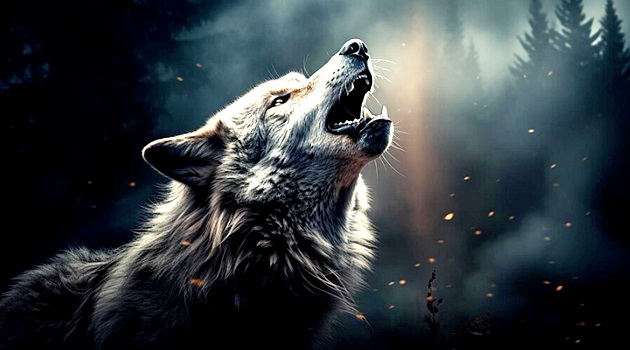1431

The European Commission's proposal to downgrade the protection status of wolves under the Bern Convention from "strictly protected species" to "protected species" has come as a blow to conservationists fighting against the "magnus malus lupus," or wolves in Europe, as reported by Euractiv.
Not a surprise
The proposal isn't entirely surprising, given that it follows the now infamous death of Ursula von der Leyen's beloved pony, "Dolly," who died in a wolf attack in 2022.
It seems that everyone agrees the top predator has its place in the European ecosystem, but in the lead-up to the European elections, is wolf debate a lure for farmer votes?
"Using the wolf as a kind of political pawn to play the game of getting votes – the wolf is truly the victim in this," says Dr. Joanna Swabe, Senior Director of Public Affairs for Humane Society International/Europe (HSI).
Political division
"It's become a real hot political potato. Seeking a downgrade of protected status for wolves and bears in the Habitat Directive has become one of those things that have been repeatedly forced onto the political agenda and was even included in the EPP manifesto for the European elections," she says.
Swabe doesn't believe that changing the protection status will solve the agricultural industry's problems. "It's essentially like putting a small Band-Aid on a gaping wound, given the broader issues facing the industry."
Protective measures issued as advice for farmers on keeping animals safe include using electric fences, shepherding, and dogs to guard the herd. Some of these methods come as second nature to farmers who have always lived with wolves' presence, such as in Romania, for example. But wolves pose a practical problem and expense for those accustomed to free-ranging their herds, though state funding helps.
"Under the rules for state aid for agricultural and rural development, farmers have already been able to get 100% compensation for any damage caused by predation and remuneration for mitigation measures implemented – the pressure should be on member states to efficiently pay out those funds," explains Swabe.
Costly protection
Italian MEP Herbert Dorfmann, the AGRI coordinator of the European People's Party (PPE), hails from the Alpine region, where he says pasturing becomes even more of a challenge for his local farmers.
"We had two pilot projects in my region last year, complying with all the measures – dogs, fences, and anything else, and there were no more attacks, but the cost of these measures was 130 EUR per sheep for the summer – more or less as expensive as the value of the entire sheep," he explained.
"A farmer is an entrepreneur. Why should a farmer engage in an activity based on continuous loss, because it is clear that he or she cannot spend 130 euros to keep a sheep for three months on an alpine pasture? The result will be, as we already see, at least in my region, farmers leaving the occupation," he says.
Apart from the costs of the measures farmers need to take, he said these are not ideal solutions in the Alps. The threat of dog attacks on passersby or restrictions imposed by electric fencing on hikers are not conducive to traditional tourism in the region.
Letter from farmers
In February, farmer groups across Europe sent a letter to Ursula von der Leyen highlighting that they are "unanimously convinced that the current problems of animal grazing with the spread of the wolf cannot be solved only with herd protection measures."
Stefan Meitinger and Julia Dost from the German Farmers' Association, one of the groups that signed the letter, quickly explain that the purpose of a change in protection is not wolf extermination.
"The subject is very emotional and complicated, but we need immediate action because from year to year, the problem grows, and in the end, we will lose farmers with animals in the regions where we want them, and this is a real problem," says Meitinger.
They've heard from farmers saying that the measures taken don't work, wolf packs seem to outsmart the dogs, wolves become wise to electric fences, and culling licenses, which are allowed under current protection, are halted in courts by activist groups.
"We need a fair discussion, because at present, there are farmers on one side and environmental activists on the other side and nothing in between," says Meitinger.
The wolf protection issue could be seen as an easy target for some politicians if farmers and activists are pitted against each other, for some it's such an emotive subject, but in some cases, the arguments don't quite stack up.
A Savanta survey last year found that large carnivores such as wolves were popular among rural residents, with 68% of those surveyed, from 10 member states, saying they believe large carnivores should remain "strictly protected."
Does the measure help?
"Reducing the protection status doesn't help protect the animals because if you allow wolf hunting, you indirectly send the message that there's no longer a need for investments in animal protection. And the wolves around will continue to kill animals if given the chance," says Sabien Leemans, Senior Officer for Biodiversity Policies at WWF European Policy Office.
Wolf populations in Europe have not yet reached a "favorable conservation status" in six out of the seven biogeographical regions of Europe. The latest WWF data shows that only the Alpine Region has a favorable conservation status.
The fear is that if wolf hunting is allowed again and the quota is too high, it could decimate the population again, and of course, they've been brought back for a reason.
Wolves have an impact on the population and behavior of deer and wild boar and have even been credited with the potential reduction of the spread of African swine fever, something pig farmers might see as positive. (Photo: Freepik)




